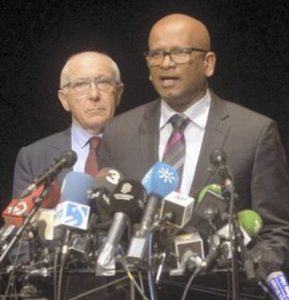Ram Manikkalingam in The National:
 Four years ago, I was in a hideout of the Basque separatist group Eta in southern France, surrounded by explosives, revolvers, grenades and rocket launchers. I was present as the chief of the commission to verify a ceasefire and begin the group’s disarmament. It followed more than three years of difficult discussions with Eta leaders, Basque politicians and Basque civil society. We convinced Eta’s leaders that clinging to weapons was going to help neither themselves nor the Basque people.
Four years ago, I was in a hideout of the Basque separatist group Eta in southern France, surrounded by explosives, revolvers, grenades and rocket launchers. I was present as the chief of the commission to verify a ceasefire and begin the group’s disarmament. It followed more than three years of difficult discussions with Eta leaders, Basque politicians and Basque civil society. We convinced Eta’s leaders that clinging to weapons was going to help neither themselves nor the Basque people.
The Basque peace process was unilateral; Madrid made no concessions to Eta in exchange for disarmament. Our efforts concluded last year in Bayonne in the French Basque region, where I accepted and certified Eta’s disarmament in the presence of the mayor of Bayonne, the Archbishop of Bologna and the Bishop of the Methodist Church of Ireland. Eta informed us where their arms caches were located, information we passed on to the French authorities, who then removed the weapons.
Two weeks ago, Eta themselves announced their disbanding in a statement read out by the director of the Henri Dunant Centre in Geneva, our partner in the effort. So ended a process of more than a dozen years, quietly and without violence and fanfare.
It was just one example of the tireless work of the Dialogue Advisory Group (DAG), which I founded, to get men with guns to make peace in the midst of violent conflict.
Although we are funded by the governments of Germany, Finland, Ireland, Lichtenstein, The Netherlands and Norway, we neither solicit nor accept funds from states with direct interests in the conflicts we work on. Sometimes we approach governments and armed groups – usually they approach us. We then begin by convincing separatists and rebels that using violence as a means to achieve goals is untenable.
More here.
